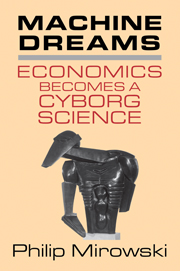Book contents
- Frontmatter
- Contents
- List of Figures and Tables
- Acknowledgments
- List of Abbreviations
- 1 Cyborg Agonistes
- 2 Some Cyborg Genealogies; or, How the Demon Got Its Bots
- 3 John von Neumann and the Cyborg Incursion into Economics
- 4 The Military, the Scientists, and the Revised Rules of the Game
- 5 Do Cyborgs Dream of Efficient Markets?
- 6 The Empire Strikes Back
- 7 Core Wars
- 8 Machines Who Think versus Machines That Sell
- Envoi
- References
- Index
7 - Core Wars
Published online by Cambridge University Press: 05 June 2012
- Frontmatter
- Contents
- List of Figures and Tables
- Acknowledgments
- List of Abbreviations
- 1 Cyborg Agonistes
- 2 Some Cyborg Genealogies; or, How the Demon Got Its Bots
- 3 John von Neumann and the Cyborg Incursion into Economics
- 4 The Military, the Scientists, and the Revised Rules of the Game
- 5 Do Cyborgs Dream of Efficient Markets?
- 6 The Empire Strikes Back
- 7 Core Wars
- 8 Machines Who Think versus Machines That Sell
- Envoi
- References
- Index
Summary
INHUMAN, ALL TOO INHUMAN
“Freedom of the will” – that is the expression for the complex state of delight of the person exercising volition, who commands and at the same times identifies himself with the executor of the order – who, as such, enjoys also the triumph over obstacles, but thinks within himself that it is really his will itself that overcame them. In this way the person exercising volition adds the feelings of delight of his successful executive instruments, the useful “under-wills” or under-souls – indeed our body is but a social structure composed of many souls – to his feelings of delight as commander. L'effet c'est moi. What happens here is what happens in every well-constructed and happy commonwealth; namely, the governing class identifies itself with the successes of the commonwealth.
Friedrich Nietzsche, Beyond Good and EvilOnce the nascent postwar neoclassical orthodoxy had divaricated out-ward from Cowles and Chicago and MIT to the rest of the nation and beyond, the garden-variety negative reaction to these doctrines was that they were too “methodologically individualist,” too solipsistic, or, if you happened to be put off from the rhetoric surrounding the formalism, too “selfish.” On any given Saturday night, so the scuttlebutt went, it would invariably be the neoclassical economist who would be the last to offer to pay for a round of drinks, and the first to insist that everyone get separate checks. Many postwar economists wore these epithets as badges of honor, testimony to their thick skins and their though-minded attitudes toward the bitter truth. They had learned a thing or two from RAND about “thinking the unthinkable.”
- Type
- Chapter
- Information
- Machine DreamsEconomics Becomes a Cyborg Science, pp. 437 - 516Publisher: Cambridge University PressPrint publication year: 2001

